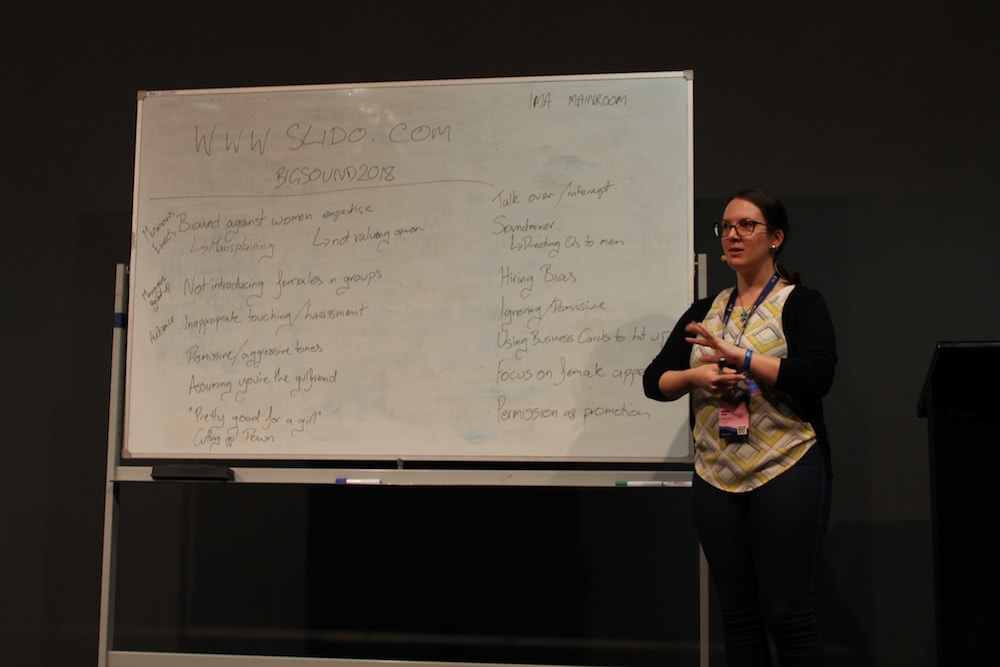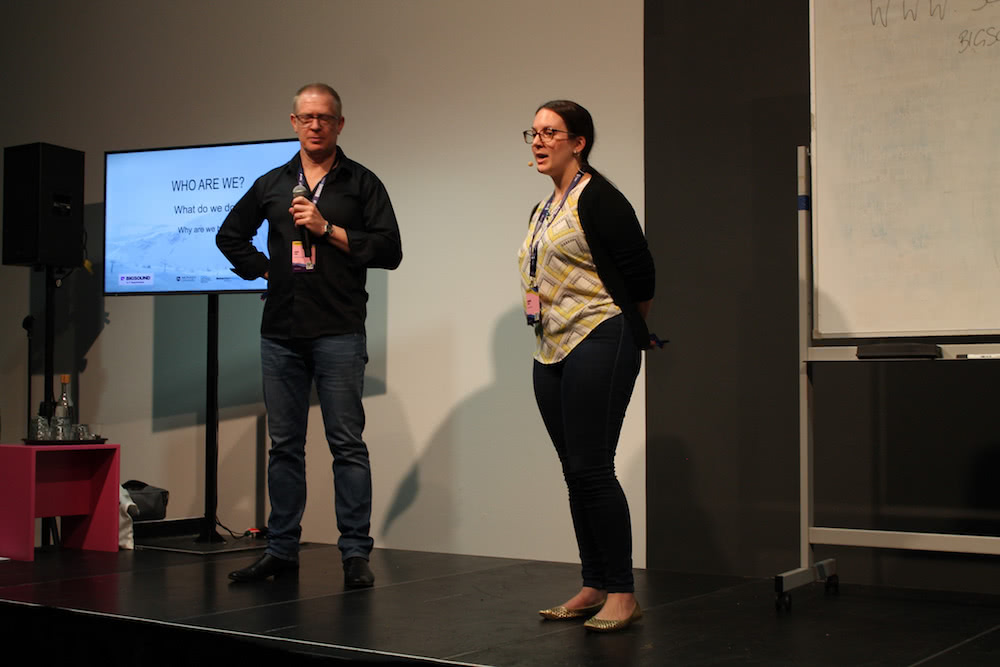The science behind ‘men behaving badly’ in the music industry

Most people believe that they are individuals and that they do things out of their own free will, but according to behavioural scientist Breanna Wright (BehaviourWorks Australia), we’re actually really strongly influenced by what others are doing. This is what us “layman’s” may refer to as social norms.
We take our social cues from observing what others around us are doing, for example: joining a queue. This is essentially because we adopt the behaviours of those around us in order to belong and choose the path with the least resistance to make our lives easier.
Marketing companies use this science to manipulate us all the time. An example of this is when electricity companies started introducing graphs and charts on bills showing the household how much energy they used compared to their neighbours or “the social norm”. This encourages the over users to scale back and the under users to be more liberal. And why? Because we like to be normal.
So what we can take from this precedent of behaviour modification is that telling people they are killing the planet by using too much energy does not change their consumption habits. However, according to Wright, showing people that they are using more energy than other people in their street did!
If you take shaking hands as an example of a social norm being adhered to somewhat unconsciously, people will usually shake three to four times because that’s a social norm and what feels comfortable. If we consciously continue the handshake past the norm and drag it out to eight to ten shakes, it gets awkward and uncomfortable.
When it comes to behaviour modification we need to make behaving badly uncomfortable for the people who perpetrate it.
THE ISSUE
The topic was discussed in depth at BIGSOUND last week when a public vote (prompted by the BIGSOUND app) was created as part of the AMIN Science of Change Forum. It was put forward to elect the topic to cover in the forum, based on what we thought was the biggest concern in the industry at present.
The topics were gender diversity on line ups, men in the music industry who were continuing to exhibit toxic behaviour yet appearing to suffer no real professional consequence, the nature of an artist’s lifestyle leading to increased mental health issues, and the expectation to always be on call and work 24/7.
For the record, I elected to talk about the “24/7” expectation as it pops up a lot as a junior in the music industry. However, the room elected to talk about men behaving badly with 43% of the votes cast choosing the topic, and with that, the discussion began.

The issues around men behaving badly in the music industry
As soon as it was announced that ‘men behaving badly’ was the topic of the forum, a gentleman behind me scoffed and clapped back with “but most men are fine”. This was the perfect audience for this panel, as a forum of victims would be less of a constructive discussion about change and more of a “trading war stories” session which we’ve been doing through social media for quite some time.
So in a way, I was actually grateful to hear this attitude reflected because we can’t change the tide if these perpetrators don’t come to the table and participate.
PROBLEMS RAISED
Responsibility was thrown to the audience to list all of the problems they had experienced within the issue and the whiteboard quickly started to fill. Some of the problems put forward included:
- Men being bias against women’s expertise and intelligence or “mansplaining”.
- Men introducing other men to each other but leaving the women to introduce themselves.
- Inappropriate touching, groping and harassment in crowds at festivals and gigs.
- Dismissive and abrasive tone of voice or “being talked down to”.
- Questioning authority when a woman is in a position of power or assuming they’re “the girlfriend”. It was at this point that another woman spoke up and shared that she was once chairing a meeting and a man asked her to go and make him a coffee. On the surface this could be dismissed as the man not doing his due diligence on the meeting, but underneath is an issue of valuing females in senior positions lower than a man in the same position.
- Male musicians making comments to women about being “pretty good for a girl”.
- Tall Poppy Syndrome and seeing a woman in a position of power and putting them down.
- Talking over women in a conversation.
- Audio technicians assuming that female musicians know nothing about their own gear or sound in general. This may be through directing their questions to the male members of the band or assuming a female is a ‘groupie’.
- Men hiring other men not based on skill set, education or how qualified the applicant may be, but based on their bias towards the capability of female employees. Personally, I have actually experienced this in reverse where I went for a job recently where I was told by the CEO of the record label that he had interviewed 4/5 of the shortlist (I was the final for the day) but that it’s “only between the four of us” as the other candidate was a male and the CEO lamented that he “didn’t think he would work well with a guy”. Let’s just say that it was a red flag for me and I was relieved to get the rejection email later that week.
- Ignoring females’ suggestions or requests.
- Using a woman’s business card to “hit her up”.
- When discussing talent, the conversation lead into appearance more for female artists than it does for male artists.
- Men promoting the above behaviours as acceptable and using “permission as promotion”.

Slide demonstrating the impact on behaviour modification using positive framing
SOLUTIONS
In order to change a behaviour, Wright says that we can’t just discourage the behaviour. We have to give the perpetrators the flip side of the behaviour and an alternative guideline so they will know exactly what will and won’t be tolerated. Wright then asked the forum, “What should these people be doing instead?”. The room threw out solutions including:
- Encouraging females to have and voice their opinions.
- Make a point to include and introduce everyone in your group.
- Instead of being dismissive or aggressive, just listen.
- Seek out female mentors to gain a wider perspective.
- Respect others’ personal space in a crowd.
- Calling out poor behaviour when you see it.
- Being polite to everyone regardless of gender.
- Admitting to your mistakes and reflecting
- And above all, we mustn’t condemn the person when they mess up, only the behaviour as positive reinforcement is proven to be more effective than negative reinforcement.
CONNECTING CHANGE WITH EMOTIONS
Remember the workplace safety ads from a few years back? The ones when the son or daughter would be waiting on the porch for their dad to get home from work with the tagline “your most important reason for work place safety is at home”?
This campaign evoked an emotional response from the general public because everyone has people that care about them and want them to return safely from work. When it comes to campaigning for a change of behaviour in the industry, we need to emotionally charge the message by connecting it to something the perpetrators care about, namely family.

Geoff Paine and Breanna Wright (BehaviourWorks Australia)
According to Geoff Paine (BehaviourWorks Australia), daughters are a particularly big influence with behaviour modification, as thinking about how other men will treat their daughter puts their own behaviour under the microscope and keeps them accountable for their actions.
Angry feminism, whilst cathartic, will never affect change in the way that positive reinforcement and emotional connection will. We just have to put it into practice within the music industry and offer alternatives to toxic masculinity.
If you’d like to check out a BehaviourWork’s event, you can find out more here.
This article originally appeared on The Industry Observer, which is now part of The Music Network.






























